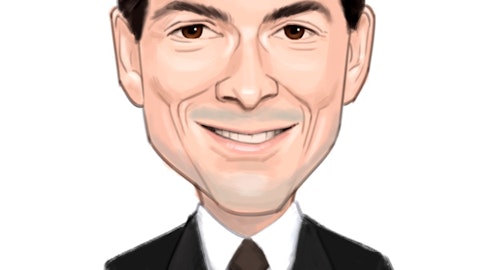Billionaire David Einhorn offered insights into Greenlight Capital’s quarterly returns in his 2019 Q3 investor letter, giving his opinion on a number of the positions held by the hedge fund. You can download a copy of it here. Greenlight Capital managed a return of 24% during the first 3 quarters of 2019, outstripping the S&P 500 Index ETFs by 3.5 percentage points. Our calculations indicate that the top 20 most popular stocks among hedge funds returned 24.4% in 2019 through September 30th, beating the S&P 500 ETF (SPY) by 4 percentage points. The results back the claim that equity hedge funds’ stock picks are performing better than passive investment strategies in the year thus far.

David Einhorn mentions his top 5 stock picks in his investor letter and goes into great detail regarding (NASDAQ:NFLX) as well, a stock on which he is bearish. Here is what he said about this stock:
“Our Netflix (NFLX) short was another material contributor as the company failed to achieve its subscriber growth targets and the stock fell from $367.32 to $267.62. In 2018, due to the runaway performance of the shares, we converted our position into puts. We have been negative about NFLX for a long time, as the company has yet to demonstrate a profitable business model. While NFLX has grown subscribers and revenues, cash costs have grown even faster. This year the company projects to burn a stunning $3.5 billion on just $20 billion of revenue.
In its early years, NFLX created a niche by licensing cheap content and growing its subscriber base with a low-priced, value offering that aggregated hundreds of popular titles owned by major studios. That arbitrage has gone away as the cost of licensed content has soared, competition has intensified and traditional studios are pulling their libraries from NFLX to launch their own streaming services. It appears to us that the value creation from streaming video on demand has gone to stand-up comics and the owners of perennially popular shows like Friends, The Office and South Park. NFLX has responded by trying to create its own content. To date, NFLX does not appear to have created any similar franchises to rival the longevity of the shows it is losing, as viewership tends to collapse soon after introduction. When was the last time you heard anyone mention watching House of Cards?
More generally, NFLX structures its site to emphasize new releases and popular licensed content while library content requires an effort to watch. And yet, NFLX amortizes its content over up to 10 years, inflating GAAP margins by deferring expense recognition. Even as its portfolio shifts from legacy titles with steady long-term viewership trends to binge-and-forget Netflix Originals, amortization as a percentage of cash spending has plummeted. At least we have heard of House of Cards; NFLX’s balance sheet likely contains capitalized values for unpopular shows like The Get Down, Lilyhammer, Atelier, Longmire, the aptly-named Disjointed, and the even more aptly-named Everything Sucks.While we enjoyed Aziz Ansari’s Right Now, we suspect 80% or more of its lifetime viewing has already happened. How and why does something like that deserve a multiple-year accounting life? We believe that management’s approach to expense recognition renders NFLX’s GAAP financials nearly meaningless.
The point is that NFLX needs to maintain a constant stream of popular new content in order to sustain, let alone grow, its subscriber base. Thus, the cash burn of over $3 billion (which NFLX promises will improve “slowly” and “gradually”) better reflects the business economics than do its GAAP financials.
When NFLX subscribers were growing at an accelerating pace, the market did not care about these pesky financial issues. However, NFLX’s domestic subscriber growth has slowed sharply in 2019. Unsurprisingly, NFLX – as is its custom3 – announced that it will no longer guide to the number of U.S. subscribers. International subscriber growth also appears to have peaked. At the same time, NFLX has begun offering heavily discounted “mobile-only” plans in some emerging markets. Bulls forecast ever-higher international prices (from roughly $9.50 per month currently to $14-15 per month or higher over the next decade), but that math breaks down as NFLX increasingly relies on $3-4 monthly subscriptions in low-income countries like India and Malaysia to maintain the global subscriber growth narrative.
Of further note, in its most recent 10-Q, NFLX adjusted its description of its pricing plans by changing one rather important word. The filing now says, “We expect that from time to time the prices of our membership plans in each country may increase change and we may occasionally test other plan and price variations.” With a disclosure like that, the NFLX story of unmitigated pricing power for years to come has to be called into question. We’re surprised no one has noticed. Then again, we were surprised in April when no one noticed another disclosure change that clarified that operating cash flow (as well as free cash flow) would be negative “for many years.”
All told, NFLX has a suspect content library carried on the balance sheet at $23 billion, supporting $8 billion of net debt, over $3 billion annual cash burn and a $117 billion market capitalization. At a time when the market appears to be re-evaluating companies that have demonstrated poor economics and rely on sustained access to the capital markets,4 we think NFLX, like many of its shows, is in the process of being de-rated.”
Earlier in the year, we reported how another hedge fund, Horizon Kinetics, was also bearish on the stock. You can find our coverage on the matter and the fund’s comments on other stocks here.
Overall hedge fund sentiment towards Netflix reached an all-time high during the second quarter and the stock currently ranks 9th among the 30 most popular stocks among hedge funds.
Einhorn does not have any long positions in other streaming companies like Amazon (NASDAQ:AMZN) which has Amazon Prime, Disney (NYSE:DIS) which is launching its own streaming service soon, Alphabet Inc (NASDAQ:GOOGL) which owns YouTube, and AT&T (T) which owns HBO and other media assets.
Apple Inc. (NASDAQ:AAPL), which also got into the streaming business recently, is conspicuously absent from the hedge fund’s long positions as well.
Disclosure: None. This article is originally published at Insider Monkey.





